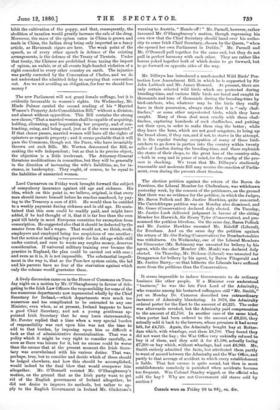A lively discussion came on in the House of Commons
on Tues- day night on a motion by Mr. O'Shaughnessy in favour of dele- gating to the Irish Law Officers the responsibility for some of the too numerous departments now represented wholly by the Chief Secretary for Ireland,—which departments were much too numerous and too complicated to be entrusted to any one Minister, even when, as at present, Ireland happens to have a good Chief Secretary, and not a young gentleman ap- pointed Irish Secretary that he may learn statesmanship. Mr. Forster replied that a time when a very special burden of responsibility was cast upon him was not the time to add to that burden, by imposing upon him so difficult a task as that of administrative decentralisation. That was a policy which it might be very right to consider carefully, so soon as there was leisure for it, but no excuse could be worse than the excuse that at the present moment the Irish Secre- tary was overwhelmed with his various duties. That was, perhaps, true, but to consider and decide which of these should be lodged elsewhere, and how this should be accomplished, would indeed be the final blow that would overpower him altogether. Mr. O'Donnell resisted Mr. O'Shaughnessy's motion, on the ground that as the Irish party want to get rid of the English government of Ireland altogether, he did not desire to improve its methods, but rather to ap- ply to the English Government in Ireland Mr. Gladstone's warning to Austria, "Hands off ! " Mr. Parnell, however, rather favoured Mr. O'Shaughnessy's motion, though expressing his own view that the Chief Secretary should hand over his autho- rity to some Irish Chief Secretary, chosen by the Queen, "when she opened her own Parliament in Dublin." Mr. Parnell and Mr. O'Donnell pull together for the same end, but they do not pull in perfect harmony with each other. They are rather like horses yoked together both of which desire to go forward, but to go forward on opposite sides of the way.


































 Previous page
Previous page